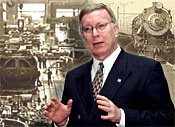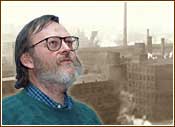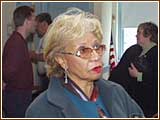INDUSTRIAL HISTORY, SWEET & SOUR
WHYY's Ed Cunningham Recounts 160 Years of Local Working Life
By Hoag Levins ...| ...April 8, 2002
CAMDEN, N.J. -- It was industrial history, sweet and sour, that the crowd gathered to see and hear at the Camden

|
| Photo: Hoag Levins. |
|
WHYY's Ed Cunningham at the Camden County Historical Society yesterday.
|
|
County Historical Society yesterday.
And WHYY's Ed Cunningham didn't disappoint them. Appearing with industrial historian Dr. Phillip Scranton, Cunningham screened his Workshop of the World documentary about the rise and fall of the smokestack factory era in Philadelphia and Camden, then opened the floor for a discussion about the fate and future of the region.
Workshop of the World, which originally aired on PBS in March of last year, provides a panoramic view of the area's dizzying industrial triumphs and depressing corporate collapses over the last sixteen decades.
During the production of the original Workshop show, the Camden County Historical Society provided WHYY researchers with access to its voluminous archives of Camden-area industrial history materials. A portion of the show's visuals came from those collections.
Former workers
Making Sunday's screening and discussion more poignant was the presence in the audience of many former workers, and the spouses and children of former workers, of such companies as Campbell Soup, RCA and New York Shipbuilding Corp.
"This program and discussion have brought back wonderful memories to me as a Camden resident with a husband who worked at the New York Shipyard," said Riletta Cream, an audience member who is a former employee at Campbell Soup and RCA as well as a current county Freeholder.
Cunningham noted that, over the last year, Workshop of the World has

|
|
Workshop of the World was first aired last March. The video is available for sale in the WHYY online store.
|
|
drawn similarly strong responses from area residents whose emotional lives are grounded in the memory of factories and communities of co-workers that aren't there anymore.
"When I was growing up, this region had thousands of factories, large and small, and the textbooks in my civics class referred to it as 'Workshop of the World.' I never forgot that," Cunningham told the crowd. "Then something happened and all of it went away. It didn't happen overnight but, rather, little by little, so many of us didn't even notice it was happening. Then, one day, we were no longer 'Workshop of the World'."
Once a world leader
Written and produced by Cunningham and heavily illustrated with period photographs, the 90-minute program documents how the Philadelphia-Camden metropolis once boasted the world's largest manufacturing company in Baldwin Locomotive, the world's largest saw works in Disston & Son, the nation's largest single employer in the Pennsylvania Railroad, the world's leading producer of recorded music in Victor Talking Machine, and

|
| Photo: Hoag Levins. |
|
Dr. Phil Scranton urged the audience to look beyond the closed factories toward future opportunities.
|
|
the place where RCA-Victor invented the television broadcasting industry.
"As you saw in this show, this is a two-city story," said Cunningham. "The more we got into the research for production, the more it became clear that it was about both sides of the Delaware River."
In its heyday, the Philadelphia side of that river had 700 textile mills that employed 90,000, while the Camden side had Campbell Soup, whose sprawling factory fed from a carpet of tomato farms and communities of workers stretching across the whole of southern New Jersey.
Streets red with juice
Part of Cunningham's project involved finding and gathering former workers from the various defunct facilities. One of the liveliest groups, he said, was the one from Campbells. "It was an experience to listen to their stories about how the streets in Camden literally ran red with tomato juice and how the air of all north Camden smelled sweet with soup."
On the flip side, Workshop of the World is also a sad tale of urban collapse on a colossal scale; throughout extended parts of the program, camera lenses play across a landscape of graffiti-sprayed wreckage of formerly world-famous factory complexes.
The Philadelphia-Camden region reached it zenith as an industrial power in the period during and just after World War II. By the late

|
| Photo: Hoag Levins. |
|
County Freeholder and former RCA and Campbell Soup employee Riletta Cream said the event brought back fond memories.
|
|
1960s, its infrastructure of heavy industry had caved in as company after company consolidated, shut down, sold out or moved away. Largely abandoned by business, whole swaths of Philadelphia and the city of Camden itself became urban disaster zones.
Many area residents, as well as politicians, scholars and urban development experts, continue to ponder and debate why what happened happened.
Camden hard hit
Dr. Scranton, chairman of the graduate history program at Rutgers University in Camden, who appeared as a commentator in Workshop of the World, said Camden was hurt far more than Philadelphia by the sweeping industrial changes of the last five decades.
"Camden got hit harder because only six big companies were responsible for almost two-thirds of its industrial jobs. And when companies like RCA, Esterbrook and New York Shipbuilding started to go down there wasn't much left. Camden was not like Philadelphia which had huge firms and then a lot middle- and small-sized firms.
He pointed out that parts of his own personal life provided insights into

|
| Photo: Hoag Levins. |
|
Refreshments for the afternoon program were provided by the Mary Cooper Gardeners, a CCHS volunteer group.
|
|
what occurred across Camden County. "Over the course of 20 years, I moved from using an office Remington manual typewriter to a very fast IBM computer," he said. "In some sense that suggests where the industry of this region once was and why it isn't there any longer."
"On a larger scale, consider that in 1880 it took 65% of the population to feed us. Now, it takes 3%. That's not an accident. It has to do with technological change that ultimately allows very small numbers of people to provide for a very large population. This same kind of thing happens across all areas of manufacturing."
Son of a steel worker
Scranton has deep roots in smokestack-factory culture. Son of a steelworker, he grew up in Pittsburgh as the steel business underwent wrenching changes that devastated a town built on steel.
He doesn't see industrial declines in cities like Pittsburgh or Camden as single disasters but rather as part of larger evolutions that can benefit those residents able to adjust and respond to new business realities.
"One way to look at it is that changes in local industry have freed large numbers of people from having to go into the steel mills and work as my family members once did," Scranton said. "The next generation winds up doing something very different from what their parents did as workers. You can view (the decline detailed in "Workshop of the World) as a shifting of opportunity across a different spectrum of industrial development."
South Jersey growth
In practical terms, he said, industrial planners and analysts in New Jersey's state capital see that happening. "When you talk to the people in Trenton," he said, "it's clear that their expectation for growth in the near future is all in southern New Jersey, not in northern New Jersey."
He said that the overall Philadelphia-South Jersey economy has already seen a massive expansion of medical and educational institutions that have created a new kind of industrial giant. "In the 1940s, something like 15% of high school graduates went to college. But by the 1980s that had changed to 60%. Philadelphia itself now has more large universities and small colleges than any other place in the country except Boston."
The story continues
In many ways, Cunningham pointed out, the story of Workshop of the World isn't finished. "I think one of the quiet points of the program has to do with the diversity and creativity of the people of the Philadelphia-South Jersey region. They have, throughout their history, shown an amazing flexibility and ability to change. That's really been the source of our economic power in the past and should be the source of our hope for the future."
| 




